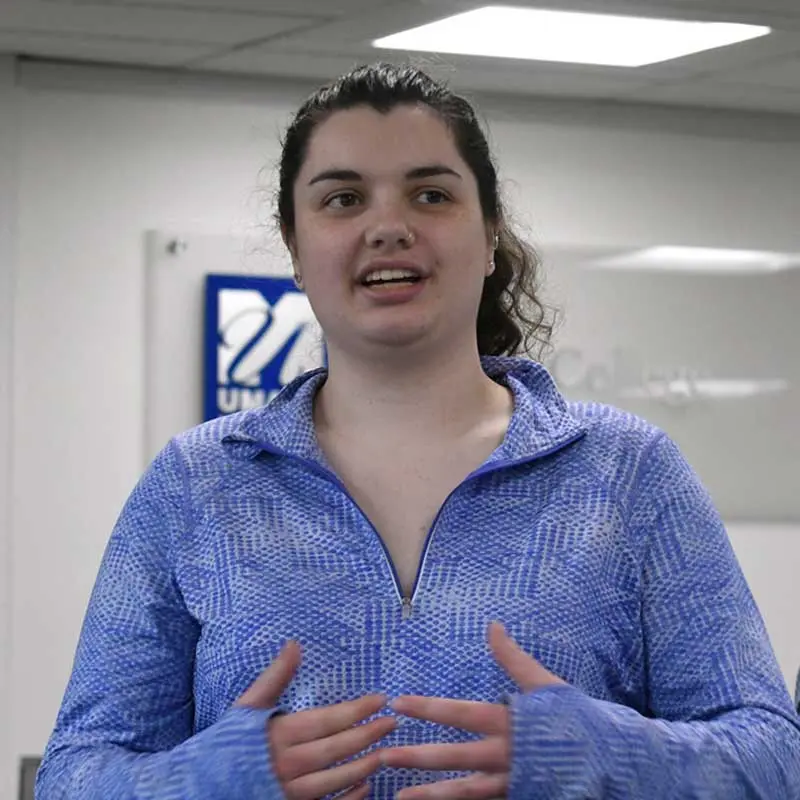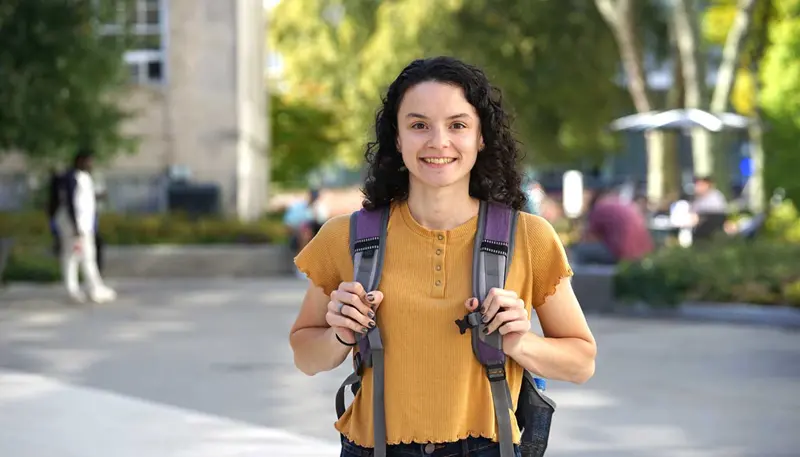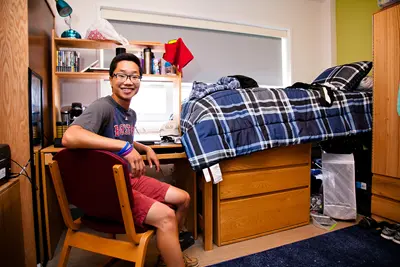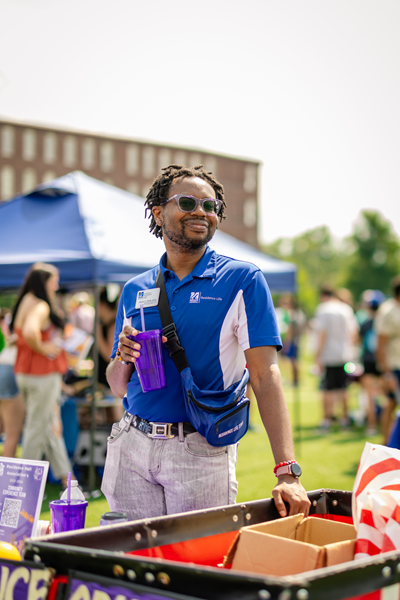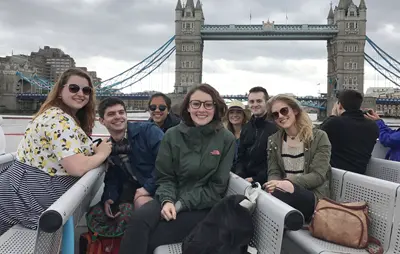For students who entered fall 2024 and beyond.
Freshman Year
Fall Semester
| Course Number | Course Name | Credits |
|---|
ENGL.1010 /
HONR.1100 | College Writing I /
First Year Seminar in Honors: Text in the City (CW) | 3 |
| MATH.1020 | Freshman Seminar in Mathematics1 | 0-1 |
MATH.1310 /
MATH.1410 | Calculus I /
Honors Calculus I (MATH) | 4 |
| xxxx.xxxx | Social Sciences Perspective (SS)4 | 3 |
| xxxx.xxxx | Science with Lab Perspective (SCL)2/3 | 4 |
| Total | 14-15 |
Spring Semester
| Course Number | Course Name | Credits |
|---|
| ENGL.1020 | College Writing II (CW) | 3 |
MATH.1320 /
MATH.1420 | Calculus II /
Honors Calculus II | 4 |
MATH.2190 /
MATH.3230 | Discrete Structures I /
Introduction to Proofs | 3 |
| xxxx.xxxx | Science with Lab Perspective (SCL)2/3 | 4 |
| Total | 14 |
Sophomore Year
Fall Semester
| Course Number | Course Name | Credits |
|---|
| MATH.2210 | Introduction to Linear Algebra | 3 |
MATH.2310 /
MATH.2410 | Calculus III /
Honors Calculus III | 4 |
| xxxx.xxxx | Non-MATH Science Elective (STEM)2 | 3 |
| xxxx.xxxx | Arts and Humanities Perspective (AH)4 | 3 |
| xxxx.xxxx | Social Sciences Perspective (SS)4 | 3 |
| Total | 16 |
Spring Semester
| Course Number | Course Name | Credits |
|---|
| MATH.2220 | Linear Algebra | 3 |
MATH.2340 /
MATH.2440 | Differential Equations (CTPS), (QL) /
Honors Differential Equations | 3 |
| xxxx.xxxx | Arts and Humanities Perspective (AH)4 | 3 |
| xxxx.xxxx | Social Sciences Perspective (SS)4 | 3 |
| xxxx.xxxx | Computing Elective5 | 3-4 |
| Total | 15-16 |
Junior Year
Fall Semester
| Course Number | Course Name | Credits |
|---|
MATH.3850 /
MATH.4070 | Applied Statistics /
Probability and Mathematical Statistics I | 3 |
MATH.4030 /
MATH.4110 | Mathematical Analysis /
Complex Variables I | 3 |
| xxxx.xxxx | Arts and Humanities Perspective (AH)4 | 3 |
| xxxx.xxxx | Free Elective6 | 3 |
| xxxx.xxxx | Free Elective6 | 3 |
| Total | 15 |
Spring Semester
| Course Number | Course Name | Credits |
|---|
| MATH.3750 | Senior Seminar I | 1 |
| MATH.3/4xxx | Math Elective7 | 3 |
| MATH.3/4xxx | Math Elective7 | 3 |
| xxxx.xxxx | Free Elective6 | 3 |
| xxxx.xxxx | Free Elective6 | 3 |
| xxxx.xxxx | Free Elective6 | 3 |
| Total | 16 |
Senior Year
Fall Semester
| Course Number | Course Name | Credits |
|---|
| MATH.4750 | Senior Seminar II (AIL), (IL), (WOC) | 3 |
| MATH.3/4xxx | Math Elective7 | 3 |
| xxxx.xxxx | Free Elective6 | 3 |
| xxxx.xxxx | Free Elective6 | 3 |
| xxxx.xxxx | Free Elective6 | 3 |
| Total | 15 |
Spring Semester
| Course Number | Course Name | Credits |
|---|
| MATH.3/4xxx | Math Elective7 | 3 |
| xxxx.xxxx | Free Elective6 | 3 |
| xxxx.xxxx | Free Elective6 | 3 |
| xxxx.xxxx | Free Elective6 | 3 |
| xxxx.xxxx | Free Elective6 | 1-3 |
| Total | 13-15 |
Total Minimum Credits = 120.
1MATH.1020 is optional but strongly recommended. If this course is completed, then total free electives are reduced by one credit.
2All Kennedy College of Science (KCS) majors in BS programs must complete a minimum of 60 credits of KCS coursework. These can be required or elective courses for majors in KCS departments or KCS courses specifically designated as appropriate for science majors. Courses with descriptions indicating they are for non-science majors or explicitly designated for non-science majors in the course description cannot be used toward this 60-credit requirement.
3Math majors, when completing their Core Breadth of Knowledge (BOK) requirement for the Sciences with Lab Perspective (SCL), must select courses from the departments of Biology; Chemistry; Environmental, Earth & Atmospheric Sciences (EEAS); or Physics. Courses with descriptions indicating they are for non-science majors or explicitly designated for non-science majors in the course description cannot be used toward the 60 credits of Kennedy College of Science (KCS) coursework requirement.
4The Arts and Humanities Perspectives (AH) and Social Sciences Perspectives (SS) are subsets of the Breadth of Knowledge (BOK) requirements in the Core Curriculum. No more than two Breadth of Knowledge courses can be taken with the same four-letter prefix.
The Core Curriculum also includes seven Essential Learning Outcomes (ELOs). The Diversity and Cultural Awareness (DCA) ELO and the Social Responsibility and Ethics (SRE) ELO are satisfied outside the major requirements. See the DCA course listing and the SRE course listing for a full list of classes that fulfill these requirements. The Class Search tool can be used to identify AH and SS courses that simultaneously satisfy the DCA or SRE requirement.
The Core Curriculum courses may be taken in any sequence. Refer to the Core Curriculum policy for further details. You should meet with your college-based professional advisor and/or faculty advisor to determine how best to satisfy the Core Curriculum requirements.
5Computing Electives - choose one of the following:
6Free electives can be satisfied by any UML course xxxx.1010 or above, with the following guidelines:
- Students only need to complete enough free elective credits to reach 120 total credits.
- Courses with the MATH prefix must be at or above the level of MATH.1225 Precalculus Mathematics I in order to count towards the minimum 120 credits required to graduate.
- No more than 60 credits of MATH coursework may be applied towards the minimum 120 credits requirement to graduate.
- The following courses do not count towards the minimum 120 credits to graduate: MATH.1280, MATH.1380, MATH.1390, MATH.1510, MATH.2195, MATH.2270, MATH.2830, MATH.3600, MATH.3630, ECON.2110, ECON.2120, PHYS.3810
7Math electives: any MATH course at 3000 level or above, except MATH.3600, MATH.3630, MATH.3810, MATH.3860, MATH.4100, MATH.4190, MATH.4660, MATH.4960, MATH.5100, MATH.5550, MATH.5760
Current UMass Lowell students should use their Advisement Report in SIS. If you need assistance, please contact your advisor.
Restriction on off-campus study:
Be advised that any course taken at another institution must be formally approved prior to enrollment. See the catalog policy for details.

